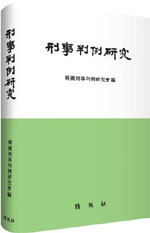학술논문
진술거부권 행사와 증거이용금지 및 피의자신문권과의 관계
이용수 11
- 영문명
- The Right not to answer, Using as Evidence the Fact of No Answer and the Right to Question
- 발행기관
- 한국형사판례연구회
- 저자명
- 이완규(Lee Wankyu)
- 간행물 정보
- 『형사판례연구』형사판례연구 제19권, 389~440쪽, 전체 52쪽
- 주제분류
- 법학 > 법학
- 파일형태
- 발행일자
- 2011.06.30
9,040원
구매일시로부터 72시간 이내에 다운로드 가능합니다.
이 학술논문 정보는 (주)교보문고와 각 발행기관 사이에 저작물 이용 계약이 체결된 것으로, 교보문고를 통해 제공되고 있습니다.

국문 초록
영문 초록
In this case, the appeal court says, the fact that the defendant used the privilege against self-incrimination and denied answering the questions of the police in the investigative process could not be used as evidence for evaluating the charge to the disadvantage of the defendant. This reference is appropriate. But the principle that we must not use the fact of no answer as evidence for regarding the assertion of the defendant as unreliable should not be confused as a principle that we must give an advantage to the no answer defendant. No answer could not prohibit the fact finder from infering truth from the indirect circumstantial facts. In this case, the defendant insisted that the drug in his body was not injected by him and he did not know how it was in his body. As two persons known visited him the day of arrest and he saw they put injectors in the waterpot, he thouhgt propably they injected the drug in his body in a stealthy way. But the defendant only insisted this story and did not give any clue with which this story could be checked up and for identifying the two persons. Therefore his assertion should be valued as unreliable because of the unreliability of the assertion itself, not because of the fact of no answer. And as the subjective factors as perception, intention, knowing etc could be infered by indirect factors, in this case, the fact that the defendant injected the drug voluntarily could be presumed from the fact that he was arrested in the intoxication in his room, there was none in his room when he was arrested, injectors were founded in his room. So the fact-finding of the court would be said inappropriate. On the other hand, the appeal court says, when the defendant decided to use the privilege against self-incrimination and not to answer, the police should immediately stop questioning. As in this case the police continued questioning, the interrogation is illegal. But this comment is inappropriate because the current criminal process law recognize the right to question to the public attorney and the police independently to the right of the defendant not to answer. Consequently the police can put questions to the defendant though he uses the privilege. But it is up to the decision of the defendant, whether he refuses all questions from the beginning to the end, or reply partly. As for ruling the interrogation, Korean law is different from the American law. Furthemore, in this case, the questions the police put to the silent defendant were for the name or for affirming whether the defendant would use the privilege or not. Because the questions are not for the fact for the defendant s charge, it would be not illegal with the viewpoint of American law.
목차
Ⅰ. 서
Ⅱ. 공소사실의 입증과 경험칙상의 추론
Ⅲ. 진술거부권행사로 인한 불이익금지의 효력범위
Ⅳ. 진술거부권행사와 피의자신문권의 관계
Ⅴ. 결론
키워드
해당간행물 수록 논문
- 진술거부권 행사와 증거이용금지 및 피의자신문권과의 관계
- 전직한 종업원의 영업비밀 사용과 업무상 배임죄
- 배임죄와 사기죄의 경합관계
- 아이템 거래 판결에 대한 고찰
- 절도죄의 객체로서 재물의 ‘재산적 가치’에 대한 검토
- 위치추적 전자장치 부착명령과 불이익변경금지
- 증언절차의 소송법 규정위반과 위증죄의 성립여부
- 형의 실효의 법률적 효과
- 불법적 · 반윤리적 목적의 승낙과 상해
- 영업범의 개념과 죄수관계
- 심신장애 판단과 감정
- 2010년도 형법판례 회고
- 협박의 의미와 대상
- 성풍속범죄에 대한 비판적 고찰
- 고소인이 간통죄의 제1심 판결 선고 후 피고소인과 다시 혼인한 경우 등과 간통고소의 효력
- 부동산 명의수탁자의 횡령죄 주체성
- 디지털 증거의 진정성립부인과 증거능력 부여 방안
- 건설산업기본법 위반죄(부정취득)와 배임수재죄의 관계
- 환자의 전원(轉院)에 있어서의 의료과실
- 권리․권한실행 의사표시의 협박죄 성립
참고문헌
관련논문
법학 > 법학분야 NEW
- 가상자산(암호화폐 등)의 법적 성질과 민사집행
- 부당한 장래적 판례변경 - 대법원 2024. 12. 19. 선고 2020다247190, 2023다302838 전원합의체 판결
- 소송법상 특별대리인
최근 이용한 논문
교보eBook 첫 방문을 환영 합니다!

신규가입 혜택 지급이 완료 되었습니다.
바로 사용 가능한 교보e캐시 1,000원 (유효기간 7일)
지금 바로 교보eBook의 다양한 콘텐츠를 이용해 보세요!



